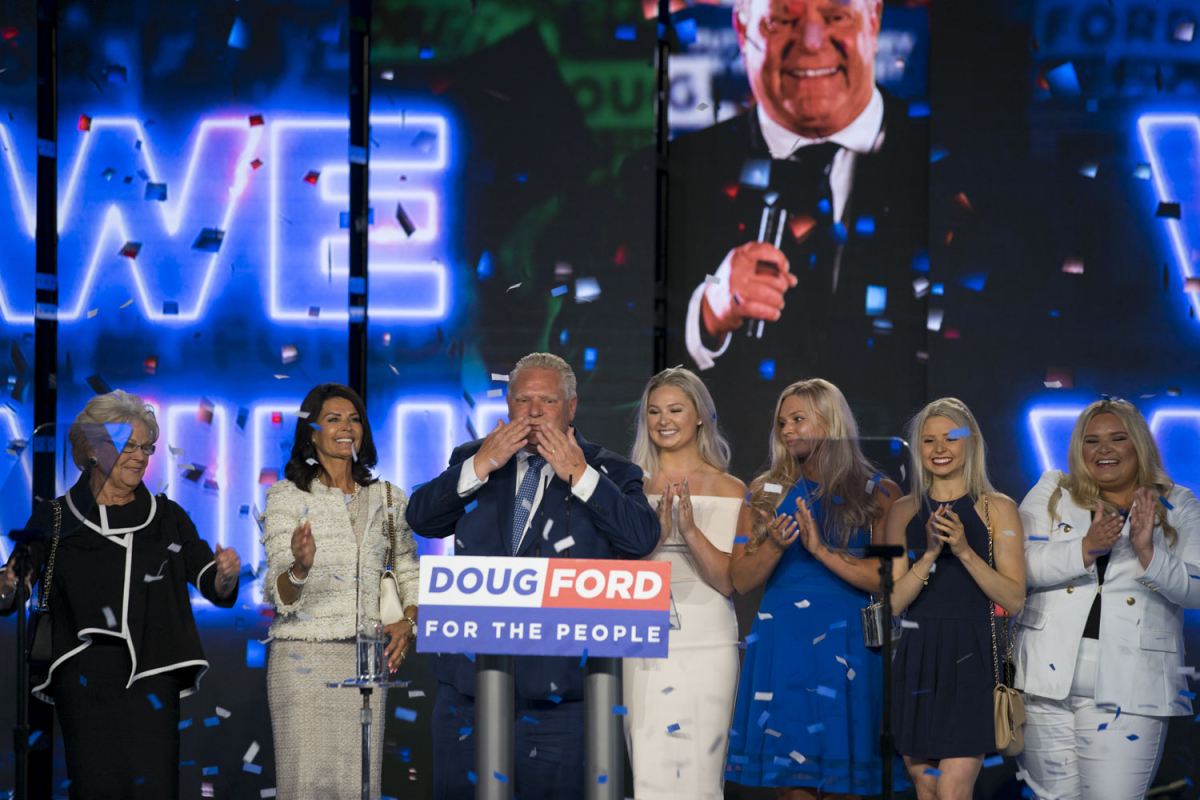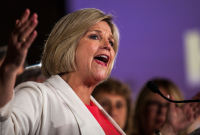Support strong Canadian climate journalism for 2025
When Rob Ford became mayor of Toronto, I was in a bar in Regina. Swift vote counting meant that there’d be no drawn out election night. The results would be delivered quickly, without emotion.
LIke ripping a bandaid off (but realizing that your wound is infected).
Ontario election nights were never so quick. In 2011, I remember watching the results roll in, so close that we didn’t know who was going to be in power for hours into the night. The political theatre was magic. It was long enough to enjoy a lot of wine.
I had a deep sense of déjà-vu when I saw that Doug Ford was projected to win not long after the polls had closed. Ontario had updated their vote counting system. I was immediately brought back to that bar in Regina, hearing that Rob had won.
The parallel between the Ford brothers and their political prowess ends there. Doug isn’t going to be the freewheeling train wreck that Rob was. The Progressive Conservatives are a machine with deep roots in governance in Ontario. The head of the party might be a slick-haired, allegedly failed businessman, but this victory isn’t Doug’s alone. Indeed, one could argue that he did his best to lose.
But the PCs have a bedrock of support in Ontario that solidified in the last years of Liberal rule, fueled mostly by high energy costs. There are deep enough roots and folksy local politicians to obscure Doug's presence. Hold your nose, vote PC. Christine Elliot as finance minister will surely keep him in check, right?
Ford victory tied to years of Liberal rule
It wasn’t latent PC support alone that elected Doug. His victory is intimately tied to Liberal rule. Fatigue explains some of why voters ditched the Liberals, but Ontarians have demonstrated that they’re comfortable with long-running governments: from 1943 to 1985, the PCs governed Ontario uninterrupted.
The Liberals are masters of political strategy, but their strategy has always been cynical. The most common phrase I heard uttered by Liberal politicians when I worked in government relations was “great is the enemy of the good,” a political orientation that underpins a lot of how they governed.
They gave enough to some, and left a lot of Ontarians to struggle with the high costs of living.
Their promise to make tuition fees free, for example, was in direct contradiction with the fact that students in higher education were given a bill each semester for tuition fees. Positive labour law reforms and a higher minimum wage could not hide the high cost of hydro. Eventually, you become fed up with the talking heads and choose change, even if that change is lead by Doug Ford.
This result has been a long time coming.
But there are deep cracks in the right-wing consensus that emerged Thursday night. Doug Ford isn’t a stable politician in a solid party. The party has deep divisions that can be exploited by progressive social activists. For example, if Ontarians voted for the PCs because they honestly think that the party will reduce energy costs, that’s one issue where he can face severe pressure.
This is where the role of the Ontario New Democratic Party, now official opposition, is so critical. The ONDP had their best showing since they were in government in the early 1990s. During the Liberal years, the ONDP has been weak - unable to pressure the Liberals to adopt ONDP policy. Finally, as the Liberals were facing certain death, they moved on variations of a theme of ONDP policy.
This election was a break from the logic that dominated the ONDP for a decade. Several candidates who challenged nominees favoured by the party brass not only won their nominations, but in many cases are MPPs now. Their connection to grassroots activism is at the heart of their success. They took long-standing Liberal ridings in many cities, not because they played a strategic game and rode a wave, but because they worked like hell to win.
Part of that work has been talking to thousands of Ontarians, and the content of those conversations holds part of the key to limiting Doug Ford’s impact. If he’s the populist that many make him out to be, he can be reigned in by people power. The only question is: what does that power look like?
ONDP won in suburban Brampton
The big news of the election for me is the ONDP’s victory in Brampton. Brampton represents the realities of life in the GTA: high housing costs, long commutes, dangerous work, suburban life and a lack of access to community services. Of Brampton’s five ridings, the ONDP won three and were not far behind in the other two.
The victory in Brampton was won by a combination of excellent candidates and, more importantly, organizing - a targeted effort to win in Canada’s ninth largest city. Now, the ONDP must balance regular constituency work with aggressively organizing to force elements of their platform into Tory plans. It’s possible, but it will require organizing that the party hasn’t engaged in for decades.
It also requires the ONDP to work closely with social movement organizers and the labour movement to break out of city centres and into Tory country. They need to use the momentum from the election to assert themselves as official opposition and use creative tactics to slow, stall or stop the PC's work.
There is a couplet from a Bruce Cockburn song that’s always in the back of my mind: nothing worth having comes without some kind of fight. Everyone emerging from an election campaign knows this. The fight dominated their lives for the past several months. But more importantly, it’s the second half that should guide the next four years: you gotta kick at the darkness ’til it bleeds daylight.
This story was updated at 1222pm June 7, 2018 to correct a quote.






Comments
Good info. Thx
Didn't really see any cracks discussed though. A political weakness is not a "deep crack".
In this brief article, Loreto touches on the core issues of our time.
Liberal rule is 'the lesser of two evils'. How could it be otherwise, given that the deep state of big money is as active in Liberal party politics as it is in Conservative power plays? Neoliberalism has taken us to where we are now...as a country and as a planet. Neoliberalism isn't going to solve the problems created by neoliberalism. Parsing a quip by Einstein should tell us that.
New thinking is required. And new kinds of organizing. Instead of bemoaning the populism of the right, we should understand its sources. High prices, low wages, precarious work, export driven economies that gut local ones, stupid mega projects like hydro electric dams and fracked backcountries to service LNG pipedreams. There's an entire mess of 'big ideas' and 'extractivist thinking' out there. Anyone who still believes these flood waters will raise all boats likely lives in a gated community.
So people's parties engaging with activists is overdue. Taking back our political voices from central parties, reminding the boys and girls in the backrooms who they work for, showing them what organizing on the ground looks like...........and choosing candidates from the community rather than the central party's preferred list of candidates..........these are all essential ideas and actions, if we want a populism that is for the actual benefit of the people.
It would be wonderful if Ford's election galvanized the Ontario NDP to make those activist kinds of changes. It would be game changing if folks who see themselves as progressive got engaged in their communities with progressive organizing.
I won't hold my breath. But it is the long road forward. And its also long past time.
10th paragraph: an all too common spelling mistake; not a typo
"is lead by Doug Ford" should be "is led by Doug Ford"
We all have to keep our game 'upped'.